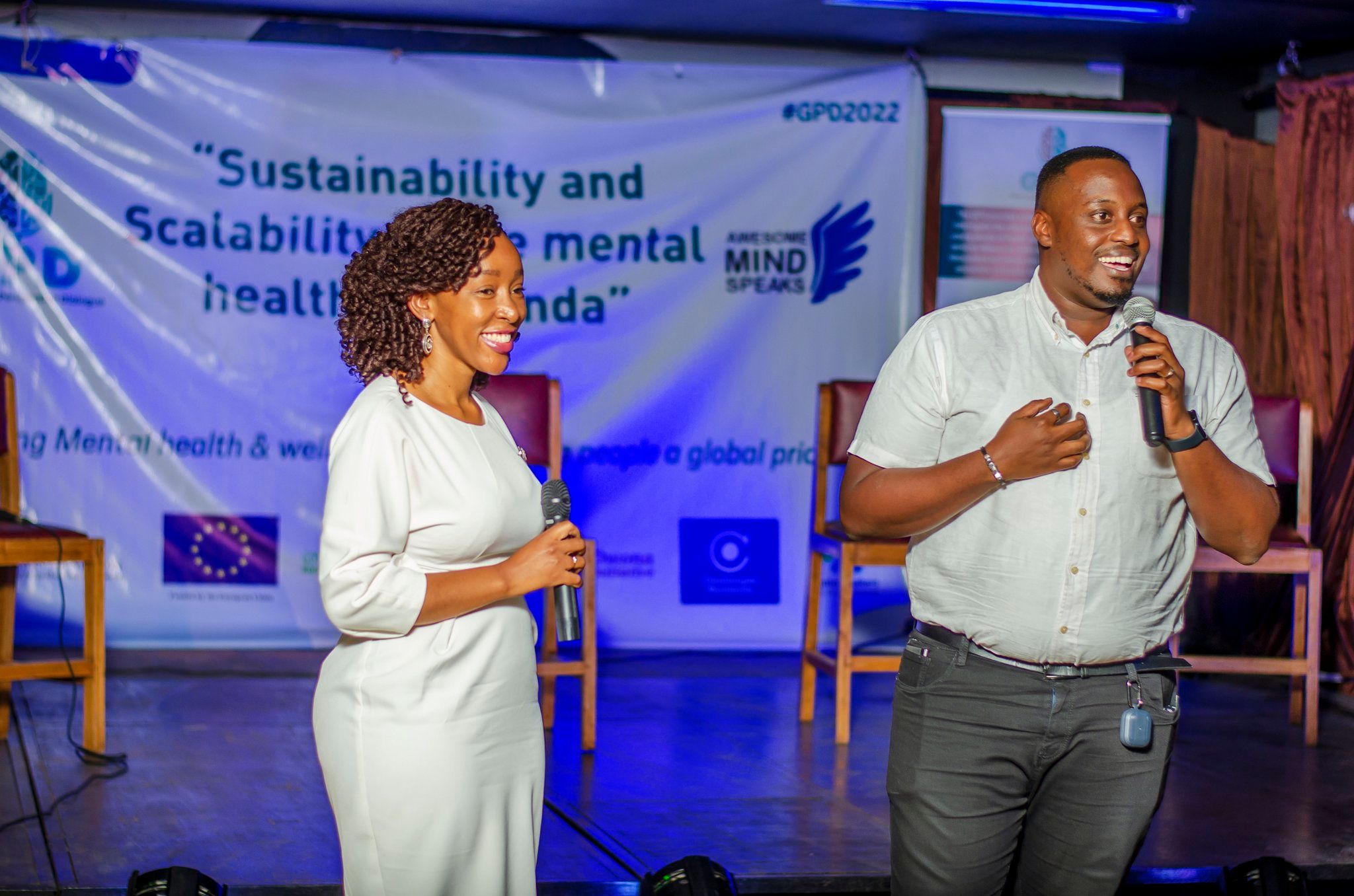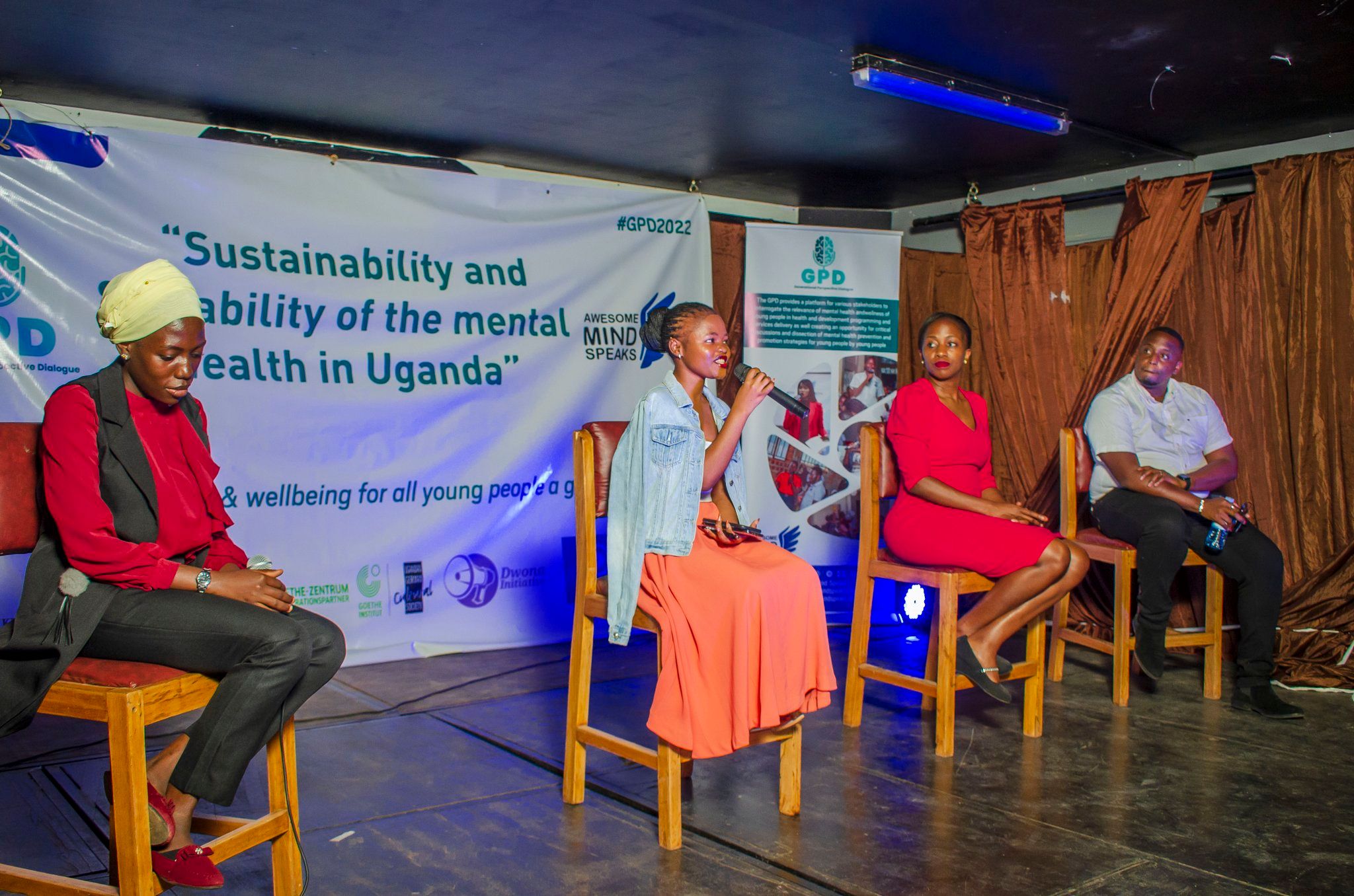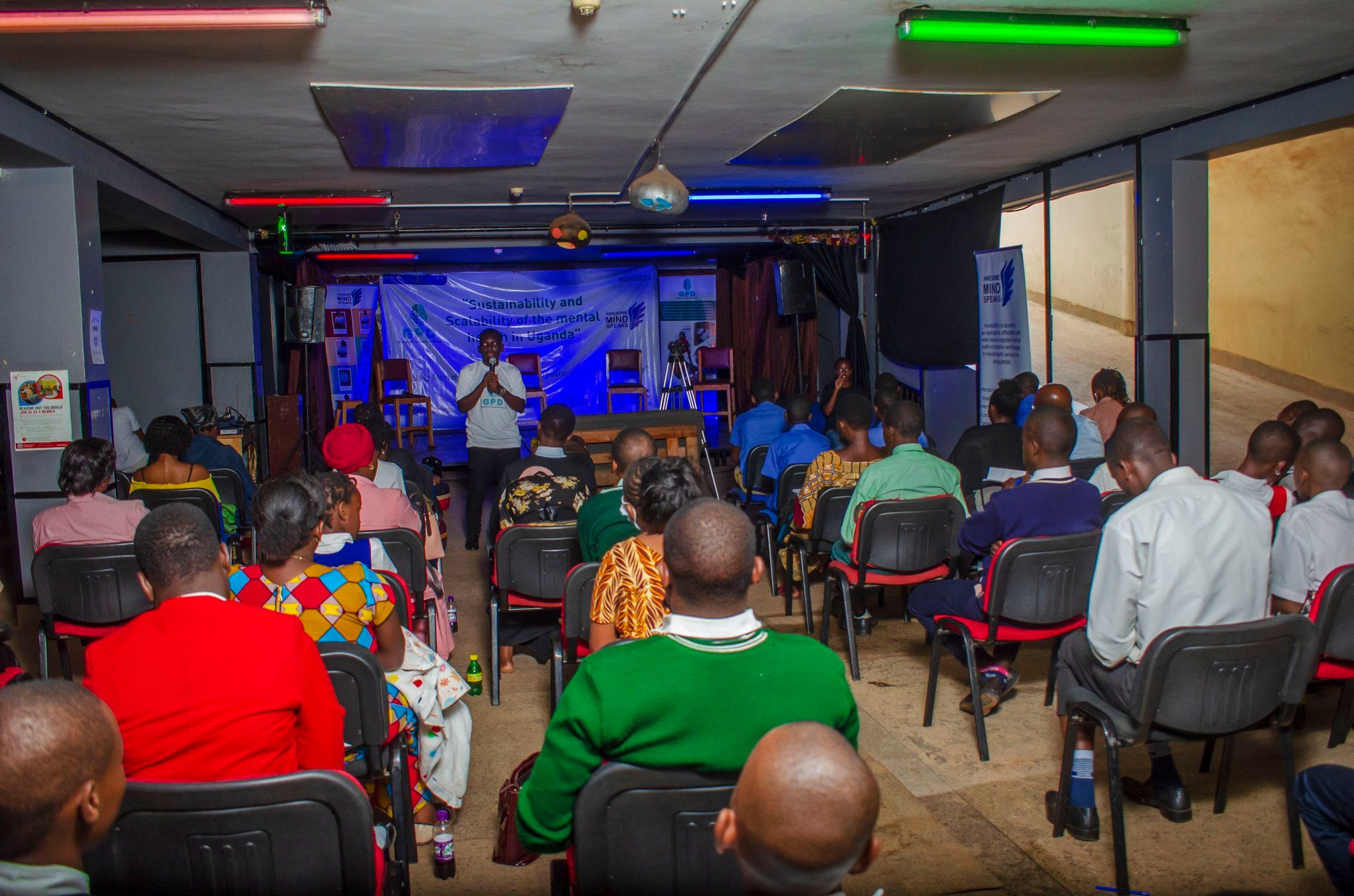The 4th edition of Generational Perspective Dialogue by Awesome Mind Speaks, with support from partners, presented an opportunity where children in Uganda were given the space to exist in conversations about their mental-wellbeing and society's mental health. The theme for the 2022 dialogue was the sustainability and scalability of mental health in Uganda.
This #GPD22 was organized in commemoration of World Mental Health day which is held every October, 10th. The event at Goethe-Zentrum in Kampala provided a conducive environment of permeable dialogue spaces where children and adults ensure mental health can no longer be ignored.
"Mental health is not a responsibility but a necessity," noted Basome Gavin, a secondary school student and one of the panelists for the GPD; he founded a club at his school called 'clean your mind', which has created awareness for his fellow students on mental health challenges and how to overcome them.
The dialogue allowed children to listen directly to people that have experienced mental health issues considered insurmountable, and in that educative conversation space, were able to know that they were not alone. This sentiment was emphasized by Roy Ronald, one of the panelists at the GPD.

Karen and Roy at the 2022 Generation Dialogue Perspective. Source Awesome Mind Speaks
Roy, from Trroy Studios, shared his personal experiences with mental health in conversation with Karen Hasahya, from Netya spaces, who also shared her experiences as a young school girl struggling with depression. Roy, as a performing arts student at Namasagali College, always knew he wanted to entertain but, it took COVID-19 to transition from a corporate occupation to hone in on his artistic persona whilst wading through anxiety and stress.
In this conversation, #GPD22 opened up the space of sustainability because not only did the students see their role models as successful, they were also sensitized about the importance of mental health. They got to appreciate the very nuance of being aware of mental health in a way that makes it the necessity it is. In fact, when asked about their take-home messages, one of the primary school students from the Uganda School for the Deaf, noted that they are set to support their friends that may be struggling with mental issues.
"I have learned that I need to be free in sharing how I feel and open to people" ~ Faith, a primary school student noted. In this foundation lies the scalability and sustainability of mental health in Uganda. By this design, the young generation grows up aware of mental health and in turn influences the older generations to a level where mental health is a national task that receives more than 1% of the health budget annually in Uganda.
A Nuanced Dialogue on Mental Health

Panelist Natasha shares her experiences with suicide at the 2022 Generational Perspective Dialogue. Source: Awesome Mind Speaks
For this #GPD22, Awesome Minds Speaks chose two panels of professionals and advocates of mental health in Uganda, like the teacher and LC-III councilor from Kyegegwa District, who is dealing with visual impairment and exposed to the reality of stigma amplified by physical disability.
Other panelists included a university student and advocate who has survived seven suicide attempts, a medical doctor who specializes in psychiatry, a public health professional, the research lead at Awesome Mind Speaks, an entrepreneur, a creative artist, a communication professional, and a secondary school student who started a mental health club in his school.
The two panels discussed and engaged in open dialogue with the audience including students, teachers, and the general public. This selection of speakers enabled a diverse conversation, which embodied the nuance of scalability where mental health is appreciated for its necessitated magnitude. The take home point was that we are all consequent of mental health, especially children!
It is of need to include children in such conversations. This dialogue, fortunately, provides a learning space for children to exist outside the borders of fear disguised as "respect", within the school environment that creates a constructing power ratio of teachers - students/ adults - children.
This was reiterated by another student identified as Basoma who when asked if he feels his school is a safe space, admitted that it is not. The structure of schooling and upbringing most children are accustomed to is of fear of adults where children's mental health is rarely tended to. This was emphasized by another secondary school student who admitted that their school is not a safe space; and in being able to find a safe space at this GPD, they get to impact the teachers in the room.
"I am going to be an ambassador of mental health in school and be keener on students with mental health issues, especially as influenced by COVID-19, and be more deliberate in helping them" ~ Patrick, a school teacher at Lubiri High School mentioned.
In what appeared like a public accountability platform, teachers pledged to be kind and gentle with their students as opposed to the usual discourse of threatening and shouting at the students. This dialogue became a treaty of sorts with children and adults pledging to improve the capability of attending to mental health on an individual, societal, and institutional level.

Students and members of the public at Goethe-Zentrum Kampala for the 2022 GDP. Source: Awesome Mind Speaks
Dr. Lilian Nabwire, one of the panelists, fears for Uganda's chances of managing mental health with the over stretched psychiatrists in the country. The conversation is further enriched by a clinical psychiatrist in the audience. She notes that like in any field, specialists are few and that's what psychiatrists are- specialists in the field of mental health. But all the same, like in any other field, specialists are not the only professionals.
"When we talk about mental health professionals we include counsellors, psychologists, therapists and psychiatrists alike." ~ Justine, a graduate of Clinical Psychiatry added.
In an article that was published in the New Vision newspaper, it was revealed that of the 45 million population in Uganda, 14 million are suffering from mental disorders. Uganda's mental health situation is slowly drifting to the red zone, and there is urgent need to ensure deployment of qualified psychiatrists and other mental health professionals. In that regard, the affected people will confidently reach out to the myriad of counsellors in the country instead of aggravating their mental health issues until they can afford a psychiatrist.
As We Stand in Uganda on Mental health
The government of Uganda has tried to ensure the availability of psychiatrists at every national regional hospital in the country. In most public and private hospitals, a client can now easily access counseling services.
Organizations offering counseling services have in the recent past increased, and some can be accessed via a simple dial code or toll free. In May 2021, the Atlas Alliance partner Mental Health Uganda launched a national counseling toll-free:- 0800212121. StrongMinds, one of the organizations featured in WHO's latest report as an innovative example helping to achieve widespread mental health coverage, offers counseling with just a phone dial of *252#.
The challenge then goes on the awareness building to ensure that people understand the necessity of mental health, and they also know that help is there and all around them if they need it, more so anonymously. The discourse of mental health is still often preferred in isolation.
By making help accessible in the anonymity of private mobile phones, we each get the opportunity to access mental health help whenever needed. Additionally, digital support also scales up the reach of mental health services with. A good example is the KeepChatty mental health app that was developed by Awesome Mind Speaks, and has become a critical digital application linking young people to professional mental health information and services with the ability to stay anonymous.
The advocacy also calls upon Ugandans to seek and equip themselves with information on mental health. Difficulty is experienced in dealing with issues we have no knowledge about. As Karen shared her journey starting with a diagnosis of Manic Depression at age 15, she expressed the challenges of feeling unwell yet unable to exact her mental state.
With information, a young Karen is able to articulate her symptoms early enough and get help earlier than the adult version of her did. Sustainability will improve as information dissemination improves. Because the more accurately informed we are, the more mental health becomes a necessity that is prioritized.
Awesome Mind Speaks with funding from the European Union, through the AKDN COVID-19 response project which recognizes mental health advocacy as a significant endeavor in recovering from the effects of the pandemic, is actively soldiering awareness in schools through the "BeAwesome project". This effort takes the conversation on mental health to the children right at their most regular dwelling and natural environment.

The 'BeAwesome' team engage students on mental health at the Uganda School for the Deaf. Source: Awesome Mind Speaks
This is even more important given the resumption of normal school routine post the interruptions caused by the COVID-19 pandemic. For most adults today, childhood was spent consistently at school for three school terms a year, all the way through nursery, to upper secondary. For today's students that structure was destabilized for at least two years and that impacted most students in ways the teachers were not prepared for, as noted during the GPD.
"As teachers we were not prepared to handle the children after the pandemic in that some of the students had to be sent back home because they could no longer handle the school structure" a secondary school teacher shared.
The Task at Hand for Mental Health Advocacy
For awesome minds speak, the task was simple. Make the 2022 Generational Perspective Dialogue a place where people freely converse and learn about the nuances of mental health, regardless of one's demographics. This task was executed by well curated panels and anecdotally nuanced, yet research based discussions that could appeal to all in the audience, whilst cast in an equalized safe space. As moderated by Lizza Kawooya and concluded by Don Zane, team lead at Awesome Mind Speaks, the general sentiment that persisted was shared by a mental health advocate who summarized: "in working to prioritize mental health, each of us needs to become an ambassador and share the information we acquired in being part of the GPD".
In that good old tell-a-friend-to-tell-a-friend format, Awesome Mind Speaks ensures the scalability and sustainability of Mental health. This forward moving task demands attention from all of us. What are you doing to better the mental health provision in your society? Are you an active participant or a passive one? As we are all geared up to complete our set tasks during this year 2023, are you aware and informed yet about mental health?
